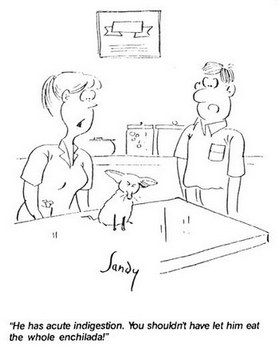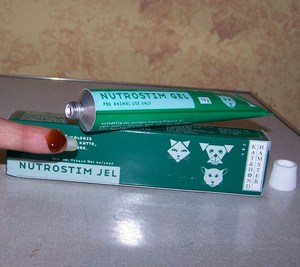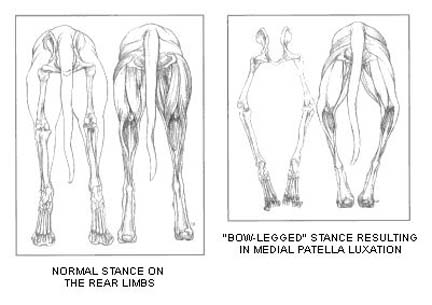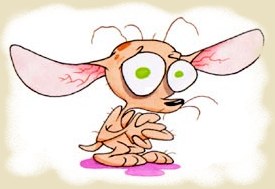Chihuahua Health Information
|
|
Because we want to insure the health and well-being of our puppies, we provide the following health and care information
for Chihuahuas, especially during the first 16 weeks of a puppy's life. This information is not intended to diagnose, treat, or replace the care of a veterinarian.
It is also not intended to dissuade you from obtaining a Chihuahua. After about 6 months of age, Chihuahuas are generally healthy little dogs which live a long lifespan.
|
|
Since Chihuahuas are prone to low blood sugar, it is especially important to make sure that they do not go without food for too long. For this reason, we recommend either free feeding or feeding several small meals a day. With free feeding, you will need to insure that your pet does not overeat and that other pets do not keep any one pet from eating. We recommend feeding a premium small bite puppy food, such as Eukanuba Puppy Food for your new puppy.

|
|
Temperature Preferences:
Chihuahuas prefer warmer temperatures and really enjoy sunbathing (just beware of the dangers of heatstroke). They don't tolerate cold well at all. If you have to take them out in the cold, try putting a "doggie" sweater or coat on them to help keep them warm.
|
|
Exercise:
 |
Because of their small size, Chihuahuas don't require a lot of exercise. Most of the exercise they need can be obtained by playing with a few dog toys. However, if you do take them for a walk, just remember that their legs are a lot shorter than yours and they practically have to run to keep up with an adult's stride. Consequently, a short walk for you would be a long run for them. Once again, make sure the Chihuahua's blood sugar doesn't drop too low. |
|
|
Socialization: Once your Chihuahua has been vaccinated and has a strong enough immune system (usually 16 weeks), it's very important to socialize them at an early age so that they will be more accommodating of new people, pets, and situations. Even though Chihuahuas need to be socialized at an early age, it is best to avoid taking your pet to the park, on walks in the neighborhood, or around other unknown pets until it has been fully vaccinated and has a fully developed immune system(usually 16 weeks of age). This is because until your Chihuahua has had its full set of vaccinations, its immune system may not be properly equipped to handle diseases with which it could come in contact.
|
|
Children: Generally, we like to sell our puppies to families with either older children or no children for two reasons. Chihuahuas are so small that a rambunctious child or even an accidental dropping or fall could result in broken bones or death to this little pet. Also, Chihuahuas that are not properly socialized at an early age can be rather intimidated by small children and may become snappy. For this reason, families with small children who adopt a Chihuahua should teach the children proper handling and care and should never leave the child unsupervised with the pet. Even a careless adult could accidentally step on the pet and injure it.
|
|
Other Pets: Chihuahuas are more comfortable with other Chihuahuas than with other types of dogs or with cats. Also, having a much larger dog or even cat could injure a Chihuahua accidentally in much the same way a child could.
|
|
Health Issues, Symptoms, and Treatment
|
|
Pre-Vaccination Susceptibility to Disease
|
|
Description: Even though Chihuahuas need to be socialized at an early age, it is best to avoid taking your pet to the park, on walks in the neighborhood, or around other unknown pets until it has been fully vaccinated and has a fully developed immune system (usually 16 weeks of age). This is because until your Chihuahua has had its full set of vaccinations, its immune system may not be properly equipped to handle diseases with which it could come in contact. Your puppy could easily get worms, parvovirus, or coccidia from contaminated feces or ground. Unfortunately, these diseases can live in feces and on the ground for many days and can be easily transmitted to a puppy. Puppies are very curious of their new surroundings and will go smelling
around the ground and trees where another contaminated dog or cat may have left their markings.
|
|
Symptoms: Symptoms could vary widely, depending on which disease your puppy has come in contact with. Parvovirus often causes either depression, vomiting, diarrhea and/or cardiac problems (Myocarditis). Myocarditis usually results in the puppy stopping nursing, crying out, and gasping for breath. Coccidiosis can cause diarrhea, dehydration, appetite loss, and anemia.
|
|
Treatment: Seek veterinary treatment immediately if your puppy has come in contact with any of these diseases and has not been fully vaccinated, as they can cause death in your puppy. Of course, an ounce of prevention is worth a pound of cure. Avoid contact with other animals and unknown places prior to full vaccination of your puppy. Have those people who handle the puppy wash their hands before handling. Since parvovirus can also be carried on the bottom of your shoes, it is a good idea to keep shoes that you wear outdoors from contacting any area where the puppy sleeps/plays.
|
|
Low Blood Sugar (Hypoglycemia)
|
|
Description: Because Chihuahuas have such a small fat reserve around their liver, they are prone to low blood sugar. Although this can occur at any time, it's especially important to watch your new puppy due to his
small size.
|
|
Symptoms: Lethargy, lack of coordination (stumbling, falling, staggering), followed by coma and death if not treated.
|
|
Treatment:
Although you should always consult your veterinarian for the proper treatment of your particular Chihuahua, you can keep some sugar handy (e.g. Glucose water, Golden Syrup, honey, sugar water) to boost your little friend's blood sugar level stays when it starts dropping. It can very easily save his ife. It is not expensive, much less than an emergency trip to the vet.
NUTROSTIM JEL is excellent to use for small puppies to treat for sugar level drop |
 |
|
|
Slipped Stifle (Luxating Patella)
|
|
Description:
| Slipping knee joints (also referred to as luxating patellas, slipped stifles) are a common problem in small breeds. In this condition, the kneecap slips out of its groove and moves against the thighbone (femur) instead of along its natural groove. Although this has been found to be a heritable condition, small, active breeds are likely to aggravate it through the course of their natural activities (jumping up and down) around taller objects such as furniture. |

|
|
|
Symptoms: Rear leg lameness, shifting from one leg to another, hopping and/or skipping, and an inability to fully extend the leg, and can result in arthritis over time. Some breeders recommend doing one of the following when buying a puppy to determine if it may have a predisposition to a slipped stifle:(1) See if a young puppy's back legs cross at the ankles when lying on its back.
(2) See if a young puppy sits up straight, rather than leaning, when sitting on his haunches.
|
|
Treatment: See a good veterinary surgeon who can diagnose the severity of the problem and recommend the correct treatment. Treatment usually involves correcting the problem surgically, where the type of surgery is determined by the severity of the condition. If treated early enough, the condition can be repaired such that the pet can lead a normal, healthy life.
|
|
Stress
|
|
Description: Because Chihuahuas are such a small breed, stress (such as diet changes, moving to a new home, etc) can affect them
physically.

|
|
Symptoms: Coughing, Diarrhea, Hypoglycemia, Infection.
|
|
Treatment: Always check first with your veterinarian to rule out a more serious reason for these symptoms, but coughing, diarrhea, and low blood sugar are fairly common Chihuahua responses to stress. Many of these symptoms are temporary and will go away once the Chihuahua gets used to their new environment or situation. Of course, you need to treat low blood sugar as described above. Because stress can cause the immune system to become depressed, this may make the puppy susceptible to bacterial and/or viral infections. Your veterinarian will best be able to diagnose this and prescribe antibiotics in the case of a bacterial infection.
|
|
Vaccinosis
|
|
Description: Because Chihuahuas are so small and because vaccine manufacturers recommend giving the same amount of vaccine to a Chihuahua as to a Saint Bernard, Chihuahuas may be more susceptible to vaccine related problems.
|
|
Possible Symptoms: Lethargy, depression, and possibly death.
|
|
Treatment: Vaccines are a very controversial subject and one you should discuss with your veterinarian. The information presented here is just an opinion and not to be used as a substitute for proper veterinary advice. Many Chihuahua breeders were losing puppies a few days after giving vaccines (especially the tiny ones) and once they started giving half doses of vaccines (the killed vaccines rather than the modified live ones), and they quit losing their puppies. Logically, you would wonder: "Why give the same dose of a vaccine to a 45kg dog that you would to a 1kg dog?" Even within the breeding community, there is
dissension about which vaccines to give. One breeder has quit giving the Leptospirosis Vaccine to their puppies based upon research at Kansas State University that suggests that there are more reactions to this vaccine than to others, and that Leptospirosis is pretty rare. Another breeder has not had any problems with this particular vaccine, although it is not given to their pups until 4 months of age. In the final analysis, the decision when and how much to vaccinate is left to the owner's and their veterinarian's discretion.
|